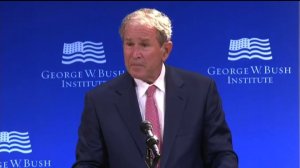[protected-iframe id=”9a1aea1fa44cbd23cb923b17f1e89433-29519520-12543204″ info=”//z.cdn.turner.com/cnn/van/resources/2.1/scripts/van-widgets.js” ]
Former President George W. Bush condemned bigotry and white supremacy Thursday while endorsing policies that run counter to those supported by President Donald Trump.
“Our identity as a nation, unlike other nations, is not determined by geography or ethnicity, by soil or blood. … This means that people from every race, religion, ethnicity can be full and equally American,” he said during remarks at the George W. Bush Institute in New York City. “It means that bigotry and white supremacy, in any form, is blasphemy against the American creed.”
He added that “bigotry seems emboldened,” though he didn’t explain why.

“We’ve seen our discourse degraded by casual cruelty,” Bush said, adding, “Too often, we judge other groups by their worst examples while judging ourselves by our best intentions, forgetting the image of God we should see in each other.”
Bush didn’t mention Trump during his remarks but did criticize the “governing class.” In his recommendations to strengthen American democracy, he said US institutions must “step up” and “we need to recall and recover our own identity.”
The speech marks a rare political appearance for Bush since leaving office. The former president has remained mostly out of the spotlight since he left the White House, reserving his political capital for his charitable works and a handful of his brother Jeb Bush’s 2016 presidential campaign stops.
He brought up growing concerns over misinformation, saying politics seems “more vulnerable to conspiracy theories and outright fabrication.”
The 43rd president, who left the presidential section of his ballot blank instead of voting for Trump, also addressed Russian influence on the United States.
“The Russian government has made a project of turning Americans against each other,” he said, adding that while Russian interference will not be successful, “foreign aggressions, including cyberattacks, disinformation and financial influence, should never be downplayed or tolerated.”
Bush, who entered into several free trade agreements during his tenure in the White House, referred to a trend towards protectionism, an apparent allusion to some of Trump’s trade actions, which have included his decision to withdraw from the Trans-Pacific Partnership early this year and his warning that he’s considering “stopping all trade with any country doing business with North Korea.”
Bush also praised the positive contributions of immigrants — a statement seemingly aimed at the Trump administration’s hardline stances on immigration and border security.
“We’ve seen nationalism distorted into nativism — forgotten the dynamism that immigration has always brought to America,” Bush said. “We see a fading confidence in the value of free markets and international trade — forgetting that conflict, instability, and poverty follow in the wake of protectionism.”
The former president also addressed concerns over bullying among American leaders.
“Bullying and prejudice in our public life sets a national tone, provides permission for cruelty and bigotry, and compromises the moral education of children, the only way to pass along civic values is to first live up to them,” he said.








